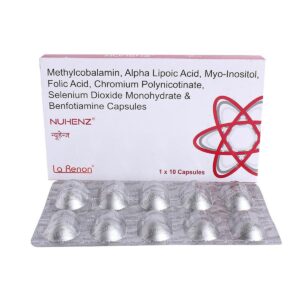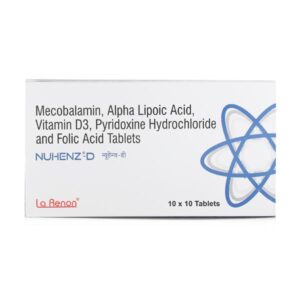BENFOTIAMINE + METHYL COBALAMIN
Benfotiamine: Benfotiamine is a synthetic derivative of thiamine (Vitamin B1). It is used as a dietary supplement to help treat and prevent thiamine deficiency. Unlike thiamine, benfotiamine has a higher bioavailability, allowing it to cross cell membranes more easily.
The mechanism of action of benfotiamine involves the activation of enzymes that are involved in the metabolism of glucose. It works by reducing the effects of advanced glycation end products (AGEs), which are harmful substances that can accumulate in the body due to high blood sugar levels. By blocking the formation of these AGEs, benfotiamine helps protect against diabetic complications, such as nerve damage and blood vessel damage.
The recommended dose of benfotiamine can vary depending on the specific condition being treated. However, a common dosage range is around 150-300 mg per day, taken with food. It is important to follow the instructions provided by a healthcare professional or the product packaging.
Benfotiamine is generally considered safe when taken at recommended doses. However, like most dietary supplements, it can have potential side effects. Common side effects may include gastrointestinal discomfort, such as nausea and vomiting. In rare cases, allergic reactions such as itching or rash may occur.
It is important to note that while benfotiamine has shown promise in research studies for various conditions, including diabetes and neuropathy, more studies are needed to fully understand its effectiveness and long-term safety profile. Therefore, it is always advised to consult with a healthcare professional before starting any new supplement or medication.
Methyl Cobalamin: Methylcobalamin is a form of vitamin B12. It is used as a dietary supplement to treat vitamin B12 deficiency and certain neurological conditions. Methylcobalamin is essential for the proper functioning of the nervous system, as it plays a key role in the synthesis of myelin, a protective coating around nerve fibers.
One of the primary functions of methylcobalamin is to assist in the conversion of homocysteine to methionine, an essential amino acid. It also helps in the formation of red blood cells and DNA synthesis. As a result, it is crucial for maintaining normal brain and nerve function.
The recommended dose of methylcobalamin varies depending on the individual’s age, sex, and specific medical condition. In general, the usual adult dose for vitamin B12 deficiency is 1000-5000 mcg injected into a muscle or as directed by a healthcare professional. The frequency and duration of treatment will be determined by the severity of the deficiency and the response to therapy.
Side effects of methylcobalamin are usually mild and rare but may include headache, nausea, diarrhea, itching, or a feeling of swelling all over the body. If any severe allergic reaction occurs, such as rash, itching or swelling, dizziness, or difficulty breathing, immediate medical attention should be sought.
Overall, methylcobalamin is a safe and well-tolerated vitamin B12 supplement that can help alleviate symptoms of deficiency and support neurological health. However, it is important to consult a healthcare professional before starting any new medication or dietary supplement.


